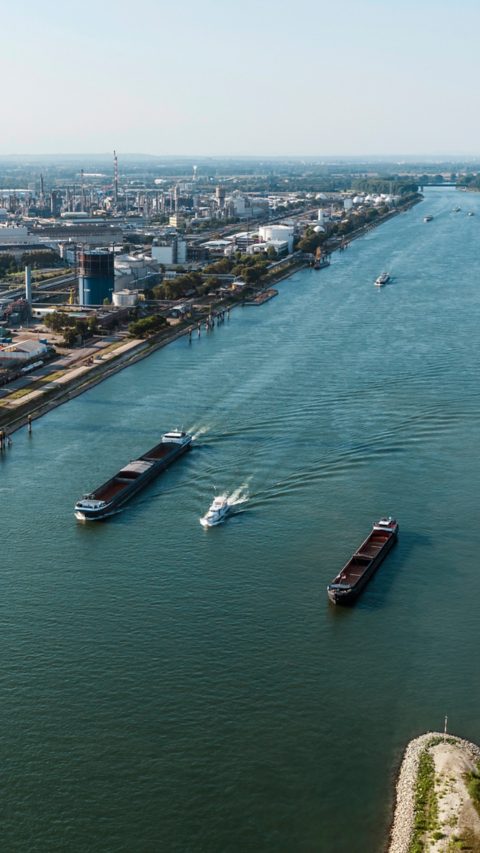1232,7 Kilometer
This is the length of the rhine. It connects the Alps with the North Sea. It flows through Germany over a distance of 865 kilometers.

From Basel via Ludwigshafen to Mainz, continuing past Koblenz and Cologne, all the way up to Rotterdam, the Rhine is home to numerous economic sites, which line the banks of the river like pearls on a necklace. Initially, it was the textile industry which first discovered the benefits of the Rhine, closely followed by the chemical industry. Nowadays, some of the largest steel, automotive, textile and chemical plants in the world line the banks of the river, with canals connecting the Rhine to the Baltic Sea, the Mediterranean See and the Atlantic Ocean.
Without the Rhine, industrial production in western Europe would collapse, as industrial corporations not only use the shipping lanes to turn around raw materials and products, but also use the river water as a supply of both cooling water and process water. And the Rhine is also essential for generating energy, as can be seen by the numerous coal, nuclear and hydroelectric power plants.
Nowadays, the entire catchment area of the Rhine, from Switzerland to the Netherlands, comprises around 60 million people across a total of nine different countries. For many of these people, the Rhine is the basis of life, it ensures jobs, and also provides opportunities to relax. Both from a political and economic standpoint, great efforts are being undertaken to maintain the ecosystem and flood protection system of the Rhine and continue improving them further.
1232,7 Kilometer
This is the length of the rhine. It connects the Alps with the North Sea. It flows through Germany over a distance of 865 kilometers.
550 Billion €
is generated annually by Europe's largest industrial and chemical companies in the Rhine catchment area.
The path to becoming a trade route
Back in the Ice Age, around 14,000 years ago, the people who lived along the Rhine would have had no idea just how important the river would be for their descendants. Trade was already blooming along the Rhine in Roman times, while Cologne, thanks mainly to staple right, became a European metropolis. For 600 years, all ships on the Rhine had to put their goods on sale in the cathedral city before they were allowed to continue. Free shipping along the Rhine has only been possible since 1868, when the Mannheim Act was signed, alongside the obligation from the neighboring countries to maintain the river. And this agreement is still valid to this day, with Baden, Bavaria, Hesse, France and the Netherlands all signatories of it, therefore providing the foundation for a free transport market on the Rhine as we know it.
However, numerous measures were required to ensure that shipping on the Rhine is possible at all times. Even in the middle of the 19th century, floods threatened residents and businesses along the river: Islands were created and disappeared again, settlements were built and destroyed. The constantly changing river bed also led to land disputes. Johann Gottfried Tulla came up with a solution to ensure both protection against flooding and land reclamation, namely by straightening the Rhine, a project which was completed in 1876. At the beginning of the 20th century, Max Honsell, an engineer, further refined Tulla’s previous work by narrowing the river and using the erosive force of the water to deepen the shipping lanes, therefore enabling large ships to travel along the river all the way to Strasbourg. Ever more people – and with them trade and industry – settled along the course of the Rhine, which promised work and prosperity.
he Rhine Romanticists may have attempted to fight the ever-growing industrialization, but their enthusiasm turned the Rhine into a tourist attraction that still draws people from all around the world even today. From Loreley to the Nibelungs, from Brentano to Goethe – the river has always touched people in a special way and inspired them to create important works of art. Whether industrialization, growing prosperity or Rhine Romanticism – all three are inseparably linked to the Rhine and are an expression of the dawn of a new era that still characterizes Europe today: the transportation of not only goods and wares, but also of future-proof visions and ideas.
Discover the Rhine river!


